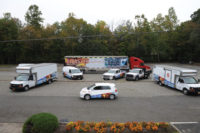Weighing the Pros & Cons: Franchise vs. Independent


















The restoration and remediation industry is always growing and evolving with the times. For some, opening a franchise is the way to go. For others, going the independent route more matches their business plans. Neither answer is right or wrong, but truly depends on each business individually – what the owner hopes to achieve, their industry focus, and even their own strengths and weaknesses.
Four industry professionals – a franchisee, a franchisor and two independent contractors – shared their honest thoughts and opinions on this never-ending debate.
The Franchise “Pros”
Jay Straughan: Chief Operating Officer, Rytech Inc. The company was founded more than 20 years ago in Atlanta, GA, by William “Bubba” Ryan. Today, it is in 20 states, and includes 29 franchises and company-owned stores.
Jason Kitts: Owner, Rainbow International of Monroe, Mich. Launched in 2009, this is one of the largest Rainbow franchises in the system, now covering several territories including Metro Detroit and Toledo.
The Independent “Pros”
Brent Pergrem: Owner, Slate Creek Contracting Services in Owingsville, Ky. With a degree in construction management and experience as a builder, Brent launched Slate Creek in 2007. The full restoration company now employs seven people.
Tim Bauer: Director of Client Relations, Allied Restoration Services, Inc. in Diamond Bar, Calif. O.P. Almaraz started the company in 2008 after working for other restoration and construction companies. Allied specializes in private claims with high-profile clients, and employs 15 people.
The Questions
1: What do you see as the benefits to being an independent company/franchise?
Straughan (franchise): If people have looked at franchising, they’re aware of the surface-level benefits. They come with branding and a reputation for service, plus peers across the country who have traveled the same path and have the ability to share best practices. But in the same breath, I would also tell them that buying a franchise does not equal business success. It’s just like any other start-up. It will take hard, focused, disciplined work on their part to start and grow their business and they must be able to be personally invested if they want to achieve success.
Kitts (franchise): Training, education and systems. I’m just a firm believer in that. Most people start a business and think they know everything. Those are the biggest things you’re paying for when you buy a franchise system and what people before you helped create. We’re recognizable. Once we met our franchise requirements, we got referrals for service immediately.
Pergrem (independent): Anyone who gets into restoration work looks at franchises. There’s a persona that you have to hit the ground running, but a franchise is only as good as the person running it. You’ll find a common theme through independents: they originate as builders first. Once you have that experience under your belt, I think the transition to restoration is easier compared to no knowledge.
Bauer (independent): As an independent, we are not limited by the brand reputation of other franchisees. I’m not limited by someone who has kind of a matching tattoo of their brand which, at the end of the day, has very little to do with me. Several years ago, as Allied was growing, there was talk about franchising, or exploding the organization because it was getting so big. Then Allied realized there was another option and started Restoration Mastery, allowing Allied to do side consulting work with restoration companies mostly out-of-state, and grow horizontally as an independent company.
2: Do you see any negatives to doing business your way?
Straughan (franchise): A franchise always pays royalties. In my view, before I became part of the franchise business and after, there is a certain value that comes with those royalties. To me, the juice is definitely worth the squeeze. Sure, you can go without royalties, be completely independent, and call your business what you want – but the benefits, in my view, of joining that business family/fraternity outweigh the attraction of being an independent.
Kitts (franchise): People look at franchises and people get upset about the dollars they’re spending. But what are you spending that money for? You’re getting logos, advertising, etc. It’s already done for us.
Pergrem (independent): We don’t get the across-the-board marketing like franchises do, we have to do it on our own. And during the economic downturn, the training and resources from franchisors could be incentive to get things going. The truth is in the work, so I rely a lot of word-of-mouth. Without experience, you have no knowledge. We get called back time and time again because of efficiency, quality, pricing, etc.
Bauer (independent): Being part of a franchise, you get immediate brand recognition which independent contractors don’t have. Homeowners know those names, there’s that immediate recognition. What you’re going to see in the next five to 10 years, insurance carriers are going to start focusing on national contracts with big companies.
3: What can you offer that your competition on the other side of the fence may not be able to offer?
Straughan (franchise): If franchise A is overwhelmed, franchise B may be able to come in to help. There are many benefits to being part of a larger system. Independent contractors also have a hard time getting on national insurance programs. Uniquely, Rytech’s franchises have all their administration details taken care of by corporate from payroll to bookkeeping, a call center, dispatchers, estimators, an interface arm with insurance companies, etc. We allow them to focus on growing their business and the challenges of running a back office of a business are almost non-existent.
Kitts (franchise): All the franchise owners are friends, especially in metro areas. If someone is overwhelmed, we help each other. During a recent flood, I was able to call in nine other franchises to help with major flooding work. It’s the same thing with equipment usage. If we need something, we can reach out to a nearby franchise and have it shipped right to us. We have a lot of buying power too. Independents have a hard time keeping up with that.
Pergrem (independent): There is a lot more flexibility as an independent contractor – no royalties or fees linked to a larger being than ourselves. We are the master of our own domain, so if we see something on a job we want to do, we do it without worry of ramifications. We might also be more flexible with pricing, and be able to offer more to the homeowner.
Bauer (independent): We don’t have to pay corporate fees. We have written standards for us and can make sweeping changes across the organization without having to run it by people higher up. A few years ago, we saw the writing on the wall – 500 restoration companies within 50 square miles and the economic downturn. We changed focus and marketed ourselves to target a difference audience. If our vans matched other franchisees, we wouldn’t be able to rebrand in that way. A lot of people enter franchise space for education, but in my experience, they are left wanting more.
4: What does it take to be successful doing business your way?
Straughan (franchise): Because we do everything centrally, our franchisees go through the same process with every claim. So, we’re highly consistent location to location. Our system and process makes it very difficult for a franchisee to try to pay for their daughter’s wedding with a single claim. What it takes to be a successful franchisee at Rytech is firstly, to know your product, what you do, and execute it well; secondly, to remember you’re a guest in the home or business you’re mitigating; and third, to be a partner to the insurance industry and customer and charge a fair price for your service.
Pergrem (independent): You just have to be good at what you do. You have to put the work in. The business is constantly evolving. You have to be willing to adapt and never stop learning. My biggest success as an owner is to learn new things. I enjoy going to training, conferences, etc. because I really enjoy this business. The job comes first, the money comes second. I have my employees work in the field with certified technicians before sending them to training. Training later helps what they’ve learned in the field click, it’s like the icing on the cake.
Looking for a reprint of this article?
From high-res PDFs to custom plaques, order your copy today!

















